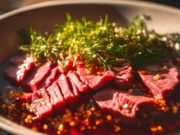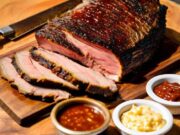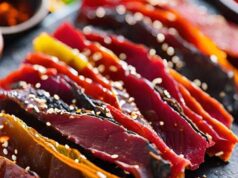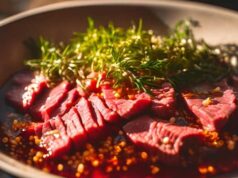- Key Takeaways:
- History of BBQ Sauces, Rubs, and Marinades
- Types of BBQ Sauces
- Essential Ingredients in BBQ Sauces, Rubs, and Marinades
- Homemade BBQ Sauces, Rubs, and Marinades Recipes
- How to Choose the Right BBQ Sauce
- Effective Ways to Use BBQ Sauces, Rubs, and Marinades
- Storage and Shelf Life of BBQ Sauces and Rubs
- Do You Need to Refrigerate BBQ Sauces?
- Health Considerations for BBQ Sauces
- Creative Ways to Spice Up Your BBQ Flavors
- Frequently Asked Questions
Spicy BBQ represents more than just a cooking style; it is an experience designed to tantalize the taste buds and foster connections among people.
This guide delves into the essentials of spicy BBQ, addressing everything from the history of sauces, rubs, and marinades to the key ingredients that contribute to unforgettable dishes.
Whether you are aiming to create homemade recipes, explore the best store-bought options, or discover innovative techniques to enhance your BBQ skills, this article provides the information you need.
Now is the time to ignite the grill and embrace the bold flavors!
Key Takeaways:
- Spice up your BBQ game by understanding the basics and appeal of spicy BBQ.
- Create your own signature flavors with homemade BBQ sauces, rubs, and marinades recipes.
- Learn about health considerations and storage guidelines for BBQ sauces, rubs, and marinades.
History of BBQ Sauces, Rubs, and Marinades
The history of BBQ sauces, rubs, and marinades presents a rich tapestry of culinary traditions that have significantly evolved over time, shaped by regional flavors and cultural practices.
Specifically, the journey from simple fire-cooked meats to the complex and diverse array of sauces available today exemplifies the unique contributions of various locales. In Kansas City, for example, the BBQ sauce is celebrated for its thick, sweet tomato base, reflecting the area’s agricultural abundance. In contrast, Memphis is known for its tangy tomato and vinegar-based sauces that pair perfectly with pulled pork, showcasing the Southern affinity for slow cooking.
Carolina BBQ introduces a different dimension with its vinegar and mustard-based sauces, highlighting the region’s historical connections to both European and African culinary influences. These variations not only emphasize distinct flavors but also signify regional identities and communal traditions, solidifying BBQ as a cherished aspect of American culture.
Types of BBQ Sauces
BBQ sauces are available in a wide variety of types, with each region offering its own unique flavor profile. You can experience the thick and sweet Kansas City style, the tangy vinegar-based sauces of Carolina, or the spicy variations found in Texas.
These sauces not only reflect the culinary traditions of their respective regions but also complement the specific meats they enhance. For instance, a Texas-style sauce, often crafted with a fiery blend of jalapeños and chipotle, pairs exceptionally well with beef brisket, adding a bold kick to the rich, smoky flavor of the meat. In contrast, the mustard-based sauces typical of South Carolina provide a sharp counterpoint, making them an excellent choice for pulled pork.
Spicy BBQ sauces, incorporating ingredients like habanero or ghost pepper, can elevate grilled chicken to new heights, appealing to those seeking an extra layer of heat in their barbecue experience. Each sauce, with its distinctive flavors and ingredients, plays a vital role in expressing regional identity and enhancing the overall enjoyment of BBQ.
Essential Ingredients in BBQ Sauces, Rubs, and Marinades
The foundation of any exceptional BBQ sauce, rub, or marinade lies in its essential ingredients, which define the flavor and character of the dish. These components range from tangy vinegars and rich tomatoes to sweet brown sugar and aromatic spices such as garlic and smoked paprika.
These ingredients work together to create a multi-dimensional profile that enhances the natural flavors of both meat and vegetables. For instance, the type of vinegar you choose—whether apple cider or balsamic—can impart a distinct tartness that balances the richness of grilled foods. The sweetness of brown sugar aids in caramelizing the outer layer, resulting in a visually appealing crust during cooking.
Incorporating herbs like thyme or oregano introduces an aromatic freshness, while spices such as cayenne pepper or black pepper can provide the heat and depth that are essential in BBQ preparations. Each component plays a unique role, and the balance among them can transform any BBQ dish into a flavorful masterpiece.
Homemade BBQ Sauces, Rubs, and Marinades Recipes
Creating your own homemade BBQ sauces, rubs, and marinades offers a delightful opportunity to explore flavors and customize your meals to suit individual tastes, ensuring that each dining experience is unique.
Whether you’re preparing a sweet, tangy barbecue sauce for slathering on a rack of ribs or a smoky rub to enhance the robust flavors of grilled vegetables, the options are virtually limitless. You can mix and match various ingredients—from maple syrup and honey for sweetness to chipotle or smoked paprika for deep, smoky richness.
Experimenting with different levels of heat, such as incorporating jalapeños or a dash of cayenne, can further elevate the taste and satisfy those who enjoy a spicy kick. The beauty of crafting these homemade concoctions lies in the personal touch, inviting creativity and enhancing your culinary adventure.
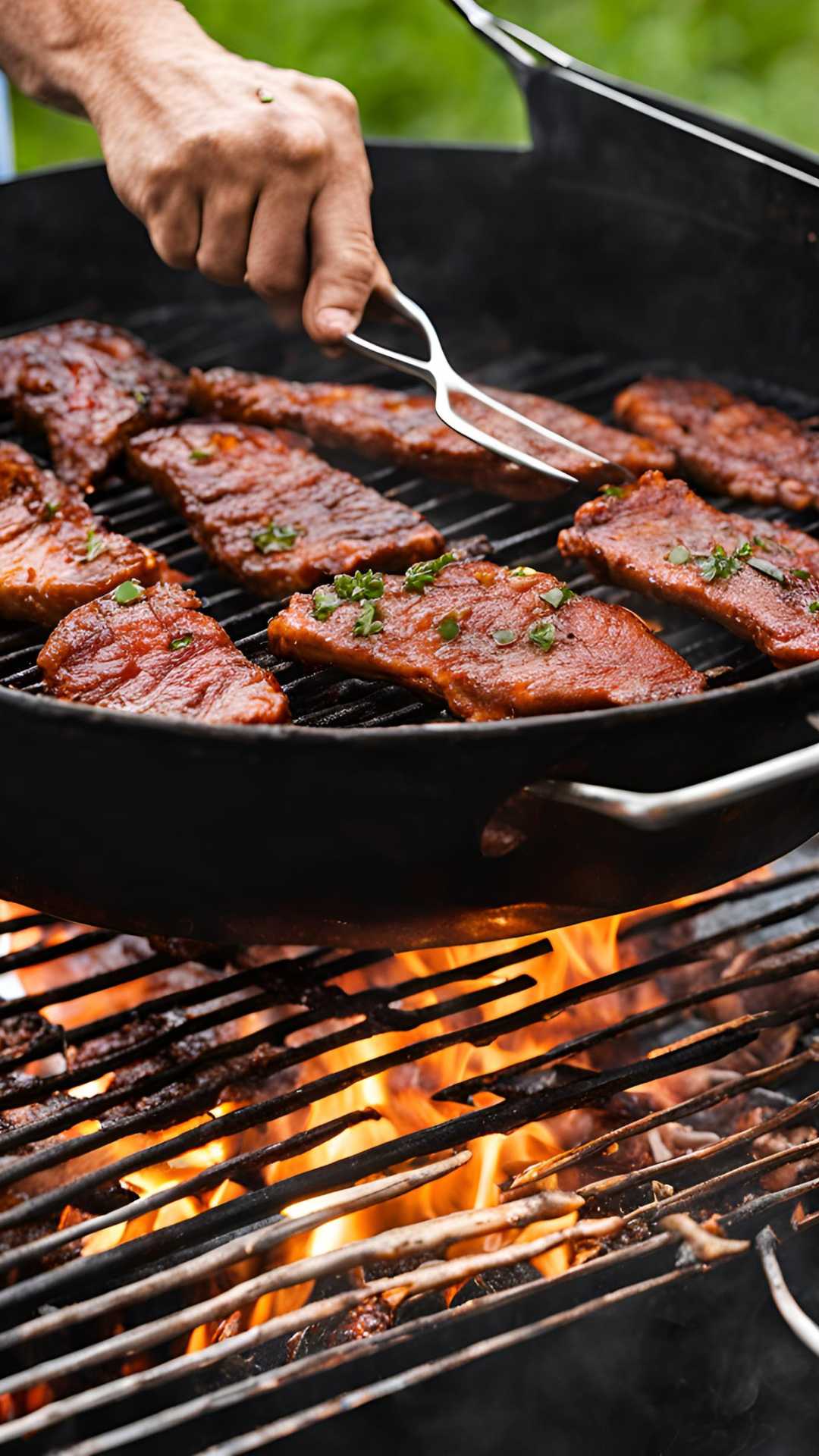
How to Choose the Right BBQ Sauce
Choosing the right BBQ sauce can significantly enhance your grilling experience, whether you opt for store-bought options or decide to craft your own signature blend.
As you explore the world of BBQ sauces, it is important to understand the various flavor profiles available, ranging from sweet and tangy to smoky and spicy. By examining the ingredient lists, you can avoid unwanted additives, as many sauces contain preservatives or high-fructose corn syrup.
For those with dietary restrictions, numerous options exist, such as gluten-free or low-sugar sauces that do not compromise on taste. Embracing a spirit of experimentation, you may consider combining different sauces or adding personal touches like honey, mustard, or garlic to create a barbecue experience that aligns perfectly with your individual palate.
Effective Ways to Use BBQ Sauces, Rubs, and Marinades
Effectively utilizing BBQ sauces, rubs, and marinades can significantly enhance your grilling skills, adding depth of flavor and moisture to your meats while ensuring that each bite is rich with delicious taste.
As a grilling enthusiast, you will find that timing is essential for achieving optimal results. For example, applying rubs at least an hour before cooking allows the flavors to penetrate the meat, enhancing its natural qualities. Marinades, on the other hand, benefit from longer contact times—ideally several hours or even overnight—to achieve the best tenderness and flavor.
When layering flavors, consider these components as building blocks: a dry rub can serve as the foundation, followed by a complementary marinade, and finished with a rich BBQ sauce added during the last few minutes of cooking. For instance, chicken can be enhanced with a spice rub, soaked in a citrus-based marinade, and then glazed with a sweet and tangy sauce, resulting in a mouthwatering dish that is sure to impress.
Storage and Shelf Life of BBQ Sauces and Rubs
Understanding how to properly store BBQ sauces and rubs is crucial for maintaining their flavor and extending their shelf life, particularly for homemade versions that lack preservatives.
Proper storage not only helps preserve the original taste but also ensures safety when consuming these flavorful condiments. For those who enjoy creating sauces from scratch, it is essential to keep them in airtight containers to prevent oxidation and contamination. Conversely, store-bought options often have a longer shelf life due to preservatives; however, they still require careful handling.
You should be mindful of the expiration dates indicated on the packaging and regularly check for any signs of spoilage, such as an off smell, unusual texture, or separation, which can indicate that the sauce or rub has gone bad.
Do You Need to Refrigerate BBQ Sauces?
The decision to refrigerate BBQ sauces often depends on their ingredients and whether they are homemade or store-bought, impacting both safety and flavor longevity.
When assessing the need for refrigeration, consider the sauce’s content, particularly if it contains high-moisture ingredients such as fresh herbs or fruits, which can promote bacterial growth if left at room temperature. Conversely, sauces that are high in vinegar or preservatives tend to be more shelf-stable. For homemade sauces, it is advisable to store them in the refrigerator to maintain flavor integrity, especially if they include perishable components.
To ensure that your sauces retain their optimal taste over time, use airtight containers and aim to consume them within a few weeks. Whether you are dealing with tangy or sweet BBQ sauces, understanding these nuances can significantly enhance your culinary experience.
Health Considerations for BBQ Sauces
Health considerations have become increasingly important in the realm of BBQ sauces, as more consumers are seeking gluten-free options and recognizing the potential benefits of various ingredients.
This growing awareness prompts individuals to scrutinize labels more carefully and select sauces that not only enhance their grilled dishes but also support their overall well-being. For example, many traditional BBQ sauces can be high in sugar and artificial preservatives, which may not align with a health-conscious lifestyle.
By opting for gluten-free BBQ sauces made from natural ingredients such as tomatoes, vinegar, honey, and spices, you can enjoy flavorful alternatives that are free from gluten and rich in antioxidants.
These essential components can promote better health by aiding digestion and reducing inflammation, making it crucial for everyone to explore healthier sauce options without compromising on taste.
Creative Ways to Spice Up Your BBQ Flavors
Exploring creative ways to enhance your BBQ flavors can lead to delightful new taste experiences, encouraging you to experiment with various spices, herbs, and unconventional ingredients.
For instance, incorporating spicy fruits like pineapple or mango can add a tantalizing sweetness balanced with heat in your BBQ sauces, while a hint of smoked paprika or chipotle powder can elevate the depth of flavor in your rubs. Consider using unusual liquid bases such as coconut milk or infused oils, which can introduce exciting new profiles to your dishes.
Customized marinades provide an opportunity to blend fresh herbs like cilantro or mint with traditional spices, allowing for a fusion of flavors that can surprise any palate. Additionally, utilizing spicy condiments like kimchi or harissa can transform your barbecue experience, creating a memorable dish that captures both the fiery and savory elements enthusiasts seek.
Frequently Asked Questions
What are the key ingredients for a spicy BBQ sauce?
The main ingredients for a spicy BBQ sauce are usually chili peppers, garlic, vinegar, and sugar. However, depending on the type of cuisine and personal preference, other ingredients such as cayenne pepper, chipotle, or even fruit can also be added for an extra kick.
How do I make a spicy BBQ rub?
A basic spicy BBQ rub can be made by combining chili powder, paprika, brown sugar, salt, pepper, and any additional spices or herbs of your choice. Simply mix all the ingredients together and rub it onto your meat before grilling. You can also experiment with different types of peppers or hot sauces for a unique flavor.
Can I use a spicy marinade for any type of meat?
Yes, a spicy marinade can be used for various types of meat such as chicken, beef, pork, or even seafood. Just make sure to adjust the amount of spice according to the type of meat and your personal taste preference.
What is the best way to add spice to a BBQ dish without using sauces or rubs?
If you want to add spice to your BBQ dish without using sauces or rubs, you can try using chili flakes, hot sauce, or a spicy seasoning blend. You can also infuse the meat with spices by using a spicy marinade or by using a spicy injection before grilling.
Are there any health benefits to consuming spicy BBQ sauces, rubs, and marinades?
Yes, spicy ingredients such as chili peppers have been found to have several health benefits, including boosting metabolism, improving digestion, and reducing inflammation. However, it is important to consume moderation and to choose sauces, rubs, and marinades with natural ingredients.
How can I make a spicy BBQ sauce less spicy without losing its flavor?
If you find a spicy BBQ sauce too hot for your liking, you can try adding a bit of sweetness to balance out the spice. This can be done by adding honey, brown sugar, or even a bit of fruit jam. You can also mix in some plain yogurt or sour cream to mellow out the spice level.









